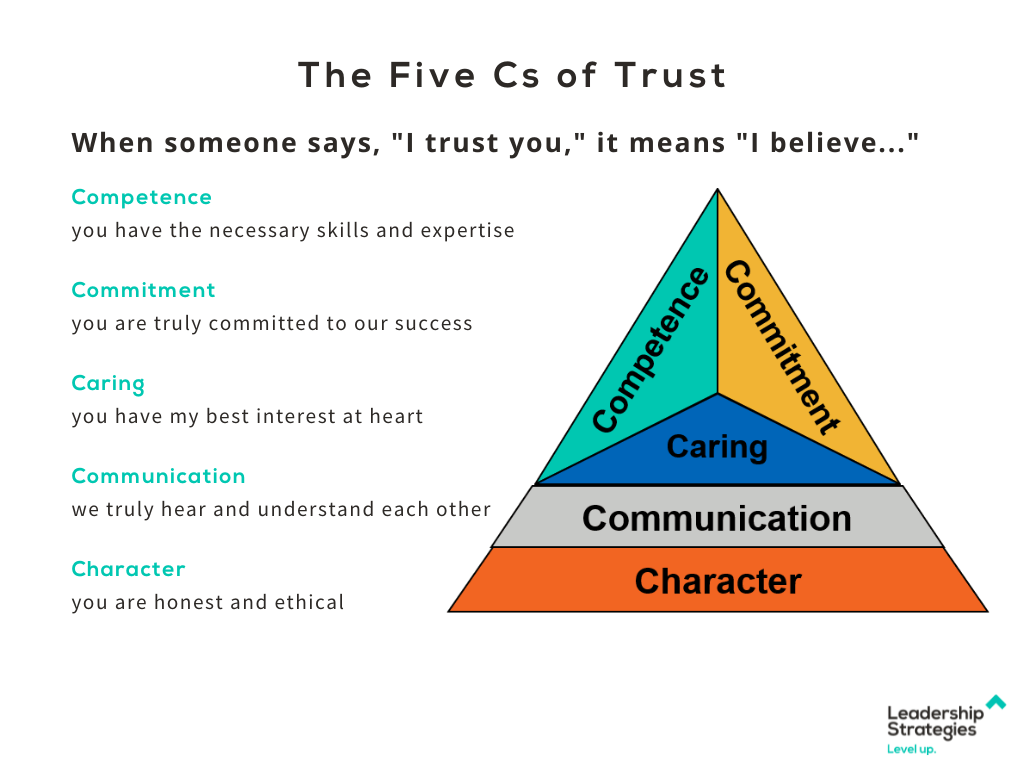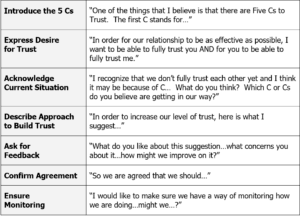Is there someone in your professional or business life whom you don’t trust or who doesn’t trust you? A lack of trust can destroy relationships, impact results, create massive inefficiencies, and result in an overall negative culture and environment. I want to share with you a lesson from my past in which I dealt with a trust issue poorly and then provide you the framework I wish I had known at the time that could have indeed made a difference.
Over a decade ago we had someone join our organization who had spent many years in a marketing role in an unrelated industry. She brought tremendous energy to our staff and a clear vision of what she felt needed to happen to propel our organization to being the leader in our industry.
While she had a compelling vision, I had concerns. For though she had significant marketing expertise, her experience was not in our industry and was with much larger organizations. I questioned whether these same strategies were appropriate for us.
- As an example, and I’m about to date myself, she felt strongly that all of our marketing collateral pieces were too detailed and needed to be reduced from the four-page fold-out format to a half-page post-card. Yet when I showed her the marketing literature distributed by our competitors, the predominant model by far was more detail not less, as most competitors used four-page or eight-page documents to gain interest. (As it turns out, she may have been a little ahead of her time. With the popularity of the Internet today, many advertisers have gone to interest grabbing post-cards that point readers to the web for additional information.)
- As well, she wanted to invest in brand awareness strategies (e.g., sponsorships to raise awareness of our company) rather than lead generation strategies (e.g., radio spots that promoted specific services). Again, I felt investments in brand awareness may have made sense for the larger companies for which she had previously worked. Yet I believed smaller companies like ours needed a direct return from every marketing dollar spent and therefore lead generation was the way to go.
She finally said one day, “Michael, why don’t you trust me? Why don’t you get out of my way and just let me do it. Why do you have to control everything?”
That question sent me to my closet for some self-examination. Why didn’t I trust her? Why wouldn’t I get out of the way? Did I really have to control everything?
- It was easy to answer the third question: No, I didn’t have to control everything. I could easily point to people in our organization who regularly made decisions in which I had little, if any, involvement. It was obvious, then, that I didn’t have to control everything; I just felt like I needed to control decisions related to marketing.
- The second question was answered by the first. Why wouldn’t I get out of the way? Because I didn’t feel I could trust her.
- So now the real question: Why didn’t I trust her?
The 5 Cs
In my book, The 8 Core Practices of a Facilitative Leader, as well as in our course, The Facilitative Leader, we show leaders our model, the Five Cs of Trust. When you don’t trust someone, it is typically because of one or more of the Five Cs.

So why didn’t I trust her? Which C was it?
- It wasn’t character. I certainly believed she was honest and ethical.
- It wasn’t communication. We communicated well together.
- It wasn’t commitment. She really was committed to our success.
- And, at least at the basic level, it wasn’t competence. She had marketing skills and expertise.
A case could be made that the real problem was that I didn’t trust her competence when it came to our industry. Yet, I believe underlying all of this was caring: I didn’t believe she would take my concerns into account. I believed that she wanted to do what she wanted to do and she felt that my concerns were simply that of a marketing-ignorant managing director.
Unfortunately, we were not able to resolve this situation and I had to “free up her future.” Yet, if at the time I knew the 5 Cs and the trust discussion model that follows, we would likely have had a different result.
Holding a Trust Discussion
In our course From Management to Leadership, we recommend the following approach when faced with a trust situation with an employee.

Of course the approach to building trust will be different for different situations depending upon which C is the problem. In the case of our marketing person, an approach to building trust might have been the following.
- Competence – I agree to have her test one or more of her different approaches on a small scale, setting specific result targets that would allow us to confirm the benefit or the weakness of the approach.
- Caring – She agree to identify with her recommendations the likely concerns I would have and the steps she would take to address those concerns.
I want to make an additional point about the 5 Cs. Our experience is that the lower the C is in the Trust Triangle, the more difficult the C is to overcome. As an example, an issue of commitment may be easily solved by the person showing up and responded promptly as needed. On the other if character is the issue, trust can be very difficult to build. It can be extremely difficult to change someone’s character or change the mind of a boss who feels an employee is dishonest. Once more, “freeing up the future” of such an employee might be the only alternative.
Who are the people with whom you are involved that you don’t trust or don’t trust you? Which C is it? What steps can you and the other people take to address the C? As a start, consider sharing this article with them and letting them know that you would like to begin building a more trusting relationship.
You can learn more powerful leadership approaches through our course, The Facilitative Leader, and through the book, The 8 Core Practices of a Facilitative Leader.
About the Author
Michael Wilkinson is the trailblazing Founder of Leadership Strategies, renowned as the foremost provider of professional facilitators and facilitation training in the US. As a Certified Master Facilitator and a Certified Professional Facilitator, Michael’s expertise is in high demand as a trainer, facilitator, and keynote speaker. With a track record of leadership in the facilitation industry, including roles as past president of the Southeast Association of Facilitators, creator of the FindaFacilitator.com database, and founding board member of the International Institute of Facilitation, Michael is a leader in the industry. Dive deeper into his wealth of knowledge through his acclaimed books, including The Executive Guide to Facilitating Strategy, The Secrets of Facilitation, The Secrets to Masterful Meetings, and CLICK: The Virtual Meetings Book.

